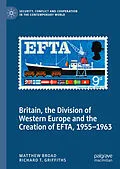This book traces the emergence of the European Free Trade Association (EFTA) from 1955 to 1963 amid the broader reshaping of the institutional architecture of post-war Europe. It considers the ill-fated Free Trade Area (FTA) proposal, the subsequent creation of EFTA, and the resulting division of Western Europe into two distinct trading blocs. At its core, the book provides an international history of a formative moment of post-war and European integration history, and explores the intense technical discussions among European states as they grappled with the prospect of deeper economic and political unity. It thus provides the first detailed analysis combining the FTA and EFTA negotiations, considering both state and non-state actors. Drawing on archives from Britain, Denmark, France, Germany, Ireland, Norway, the Netherlands, Sweden, Switzerland, and the US, as well as the records of the OEEC and EFTA, it examines the decision-making processes of those intimately involved as well as the institutional settings within which they were forced to reconcile their positions. At a key moment of contemporary European friction, the book offers a dialogue between the past and those trying to make sense of events that continue to shape Europe today.
Autorentext
Matthew Broad is Lecturer in International Relations at Leiden University, the Netherlands. Prior to this, he was an EU Marie Curie Individual Fellow at the University of Turku, Finland. Matthew is the author of the book Harold Wilson, Denmark and the Making of Labour European Policy, 1958-72 (2017) and co-editor of European Integration Beyond Brussels (Palgrave Macmillan, 2020).
Richard T. Griffiths is Professor Emeritus of International Studies at Leiden University, the Netherlands. An author/editor of over ten academic books, his expertise lies in European integration, economic history, post-war international relations and, increasingly, Chinese foreign/EU policy. Between 1987-95 he was Chair of Contemporary History at the EUI, Florence. He has also held positions at the University of Manchester and the Free University Amsterdam, and visiting professorships in Belgium, Turkey, Portugal and Thailand.
Inhalt
Introduction
1. Britain, the Six and the non-Six
The Messina Resolution
The United Kingdom and the SixExclusion from the Spaak Committee
The United Kingdom and the 'Special Relationship'
2. Plan G
Towards a New Policy
Plan G
Plan G, the Six and the OEEC
3. The OEEC Investigation of the FTA
The United Kingdom and the Six
OEEC Working Party No 21
OEEC Working Party No 22
OEEC Working Party No 23
The Six and the FTA
Denmark, the FTA and the Six
4. Starting the Intergovernmental NegotiationsThe United Kingdom's Policy Debate
Rallying the Non-Six
The United Kingdom, The Six and the FTA
The Opening of the Maudling Negotiations
Agriculture
5. The Maudling Negotiations and the End of the Free Trade Area
The Emergence of a French Policy
The Ockrent Report
An Effort of Imagination and Will
The Carli Plan
Taking Stock: The United Kingdom, France, The AmericansThe End Game
6. The Emergence of the Seven
Scandinavian Cooperation
The 'Non-six Six'
British Reassessment
The Federation of British Industry
The "Non-Six" and the collapse of the FTA
The Sommerveld/ De Besche MissionThe UK Decision
7. Creating EFTA
The Opening talksThe Danish Side-payment: Agriculture
Ministerial Meeting: Saltjöbaden 20-22 July
The Portuguese Side-Payment I: The Transition
The Swedish Side-Payment: Finland (the Eighth Participant?)
The Resumed NegotiationsPortuguese Side-payment II: Definition of Industrial Goods
The Final Ministerial Meeting
The Norwegian Side-payment: Fish
Finnish Association
8. Aftermath
The Peripherals
France
The Six
The OEEC and the GATT
The United Kingdom
EFTA
Conclusions
